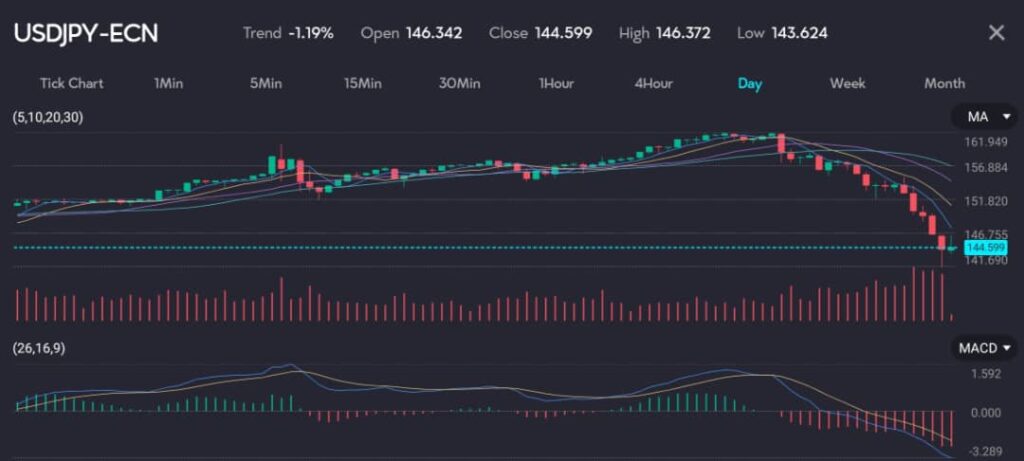Key points:
- Nikkei share average falls 20% in three trading sessions.
- Yen strengthens to 142 to the dollar, its strongest level in seven months.
The resurgence of the yen has brought Japanese stocks crashing back to earth, leaving investors scrambling to gauge the potentially diminished outlook for earnings.
In just three trading sessions, the Nikkei share average (NI225) has lost a fifth of its value. On Monday, it tumbled 12.4%, marking its second-largest decline on record and its biggest since the Black Monday crash of October 1987.
Bank of Japan’s rate hikes challenge Japan Inc’s growth

See: Japanese yen strengthens, trading at 144.599 on the VT Markets app.
This sell-off is partly driven by the recent turnaround in the yen (USDJPY) after the Bank of Japan began to raise rates for the first time in decades, most recently last week.
Now, investors must size up Japan Inc’s prospects without the extra cushion from the currency, which has helped many heavyweight exporters. Until a few days ago, the Japanese stock market was seen as a global standout, having gained almost 30% last year and touching a lifetime high last month.
Stronger yen forces companies to rely on fundamentals
Companies will now have to perform well on their own merits. A weaker yen drives up costs for small businesses and households but is largely positive for big exporters, such as Toyota Motor (7203), because it makes their products cheaper overseas and boosts profits when foreign earnings are brought home.
The yen traded around its strongest level in seven months on Monday, at 142 to the dollar. It has gained about 14% over the last month, recovering after months of losses.
While corporate Japan’s fundamentals remain largely solid, the sell-off reminds us that markets, at least in the short-term, do not always reflect fundamentals.
Many exporters assumed a yen exchange rate of 140 or 145 to the dollar, with investors expecting stronger earnings ahead given the yen traded at 160 a few weeks ago.
In case you missed it, read: Japan banks lead Nikkei higher following BOJ rate hike
Potential silver lining for the broader economy
The market turmoil may have a silver lining for investors who look beyond a group of Japan’s export champions. The yen’s reversal could offer relief to the broader economy after its months-long decline has pushed up consumer prices, raising deep concerns about the outlook for spending in Japan.
The yen’s decline has even prompted the founder of Uniqlo parent Fast Retailing to warn there was “no merit” to a weaker yen, given that Japan imports raw materials from all over the world before manufacturing and exporting.
Also read: Japan’s Nikkei hits one-month low with mixed US tech earnings and a yen rally
A stronger yen might not be good for the Nikkei 225 stocks and the foreigners owning it, but it’s good for the country and the economy.
Start trading now — click here to create your live VT Markets account.









